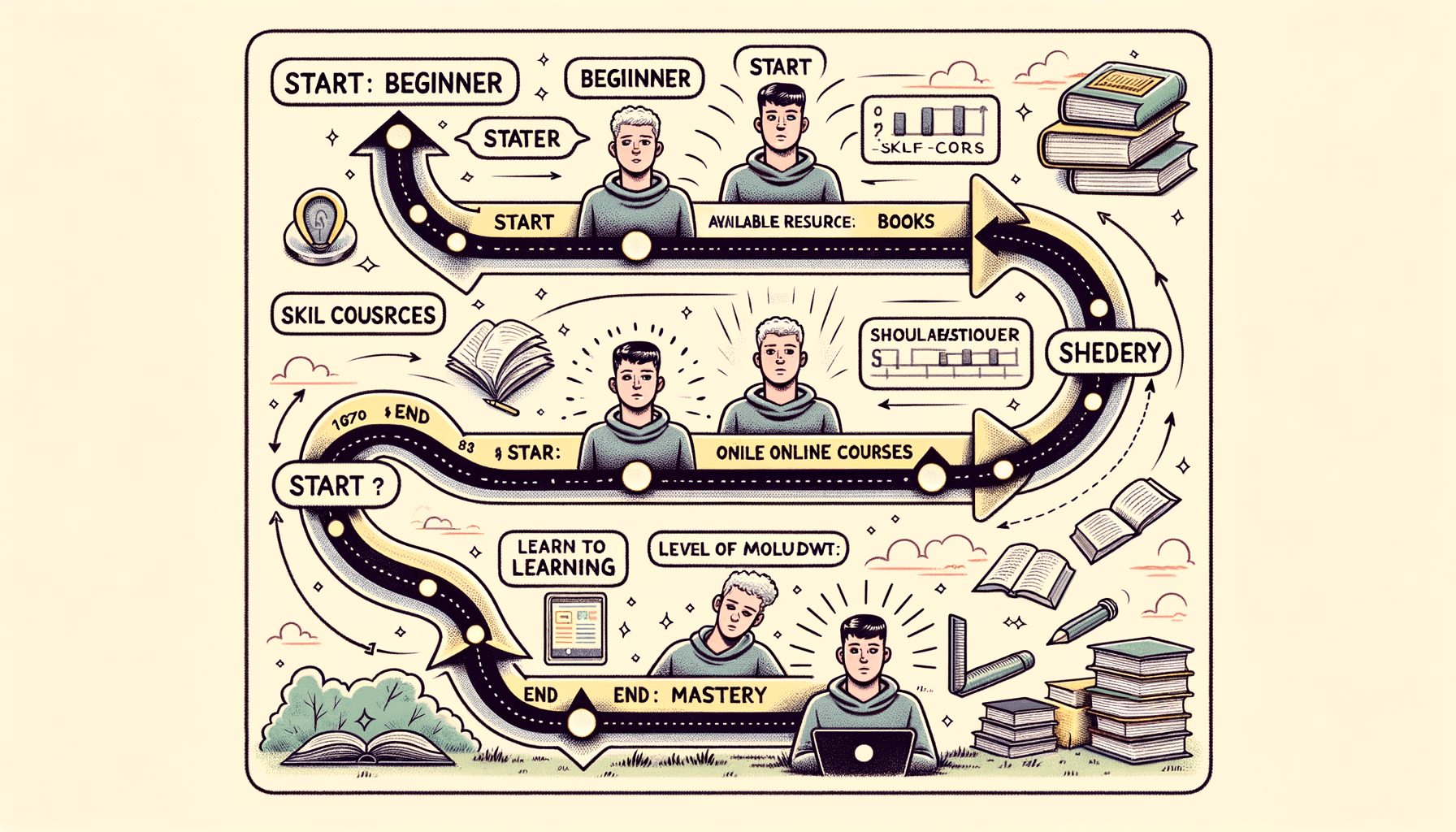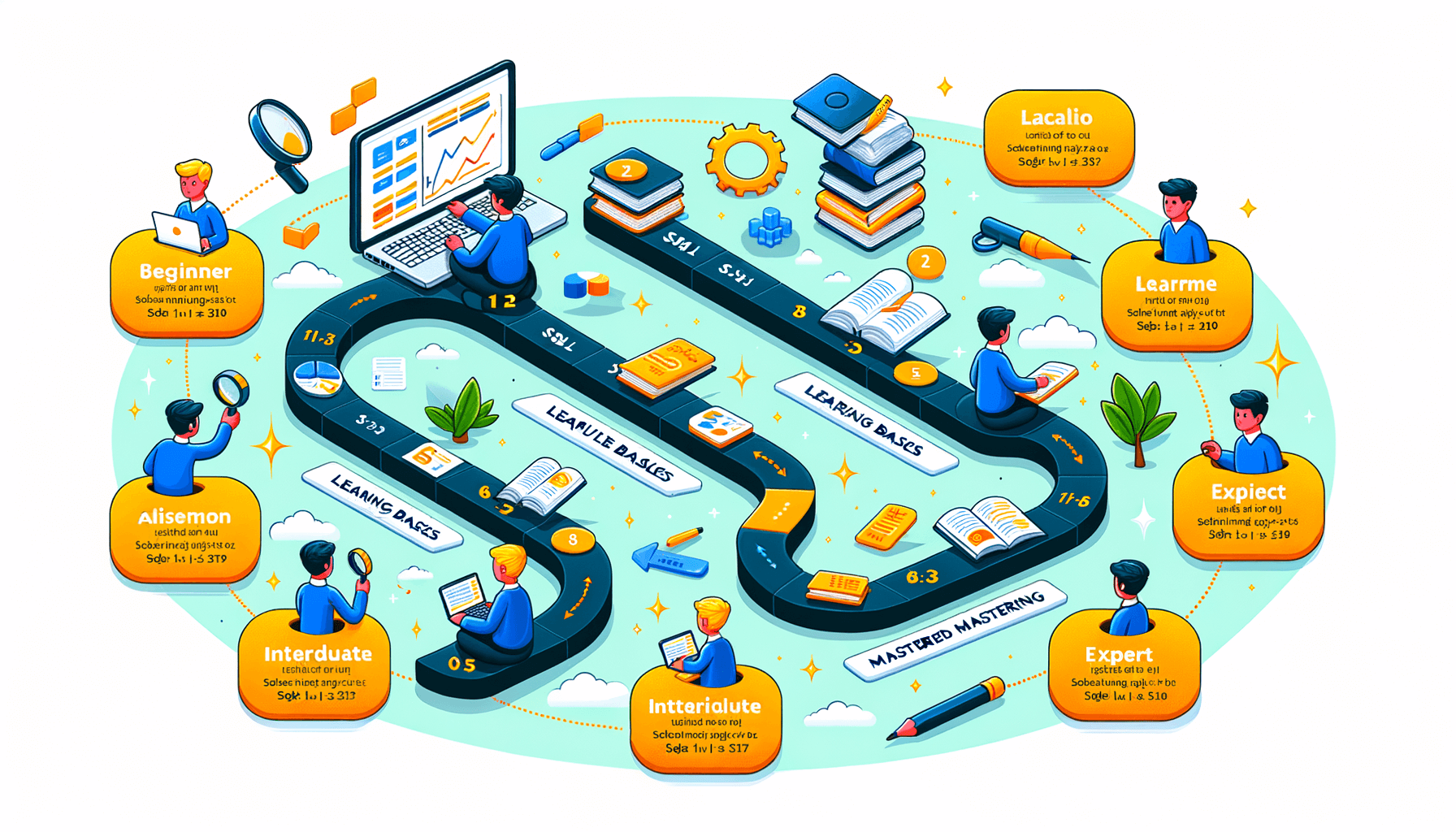A big variety of articles and resources

How to Learn SQL for Free: A Comprehensive Guide
 Sia Author and Instructor
Learn SQL
Sia Author and Instructor
Learn SQL
10 minute read
SQL, or Structured Query Language, is a powerful tool used to manage and manipulate databases. Learning SQL can open up many opportunities, especially if you want to work with data. The best part? You can learn SQL for free using various online resources. This guide will show you how to get started, practice your skills, and even explore advanced topics, all without spending a dime.
Key Takeaways
- SQL is essential for managing and working with data.
- Many free resources are available online to learn SQL, including courses, tutorials, and eBooks.
- Practical exercises like building sample databases and solving real-world problems can help you master SQL.
- Joining communities and forums can provide support and enhance your learning experience.
- Advanced topics in SQL, such as joins and subqueries, can further improve your skills.
Understanding the Basics of SQL
What is SQL?
SQL, or Structured Query Language, is a standard language used to communicate with databases. It allows us to create, read, update, and delete data stored in a database. SQL is essential for anyone working with data because it provides a way to manage and manipulate large amounts of information efficiently.
Importance of SQL in Data Management
In the world of data management, SQL plays a crucial role. It helps us organize and retrieve data quickly, making it easier to analyze and use. Whether you're working in business, science, or technology, knowing SQL can give you a significant advantage. Mastering SQL basics can open up many opportunities in various fields.
Common SQL Commands
To get started with SQL, it's important to learn some common commands:
- SELECT: Retrieves data from a database.
- INSERT: Adds new data to a database.
- UPDATE: Modifies existing data in a database.
- DELETE: Removes data from a database.
These commands form the foundation of SQL and are essential for performing basic operations. By practicing these commands, you can build a strong foundation in SQL and be well-prepared for more advanced topics.
sqlskillz.com vs w3schools.com: master sql basics, perfect for beginners, learn at your own pace. no credit card required. login or sign up to start learning.
Free Online Resources for Learning SQL
OpenCourseWare and University Lectures
Many universities offer free access to their course materials through OpenCourseWare. These resources often include lecture notes, assignments, and exams. MIT's OpenCourseWare is a great place to start, as it offers a variety of SQL-related courses. Other universities, like Stanford and Harvard, also provide free lectures that cover SQL basics and advanced topics.
Interactive SQL Tutorials
Interactive tutorials are a fantastic way to learn SQL by doing. Websites like Codecademy, Khan Academy, and W3Schools offer free, hands-on SQL courses. These platforms allow you to write and execute SQL queries in real-time, providing instant feedback. This method helps reinforce learning and makes it easier to understand complex concepts.
SQL eBooks and Documentation
There are numerous free eBooks and official documentation available online that can help you learn SQL. Websites like SQLZoo and GitHub host a variety of free eBooks that cover everything from basic SQL commands to advanced query optimization techniques. Additionally, the official documentation for SQL databases like MySQL, PostgreSQL, and SQLite is an invaluable resource for understanding the intricacies of SQL syntax and functionality.
Leveraging these free online resources can significantly enhance your SQL learning experience, providing you with the knowledge and skills needed to excel in data management and analysis.
Practical Exercises to Master SQL Skills
Building Sample Databases
Creating your own sample databases is a great way to master SQL basics. You can start with simple tables and gradually add more complexity. This hands-on approach helps you understand how different SQL commands work together. Plus, you can do it at your own pace.
Solving Real-World Problems
Applying SQL to solve real-world problems can be very rewarding. Try to find datasets related to topics you are interested in and write queries to extract meaningful information. This not only improves your SQL skills but also makes learning more engaging.
Participating in SQL Challenges
Joining SQL challenges online is another effective way to practice. Many websites offer SQL challenges that range from beginner to advanced levels. These challenges often come with a community of learners, so you can learn from others and get feedback on your solutions. No credit card required to join these challenges, just sign up and start learning with SQLSkillz.
Joining SQL Communities and Forums
Benefits of Community Learning
Joining SQL communities and forums can be incredibly beneficial for learners at all levels. These platforms offer a space to compare with other platforms and share knowledge, ask questions, and get answers from experienced SQL professionals. Being part of a community can also provide motivation and support, making the learning process more enjoyable and less isolating.
Popular SQL Forums and Groups
There are several popular SQL forums and groups where you can join for exclusive SQL news and discussions. Some of the most well-known include Stack Overflow, Reddit's r/SQL, and SQLServerCentral. These platforms offer a wealth of information and are great places to find solutions to specific problems or to learn new techniques.
How to Ask Questions Effectively
When participating in SQL forums, it's important to know how to ask questions effectively. Be clear and concise in your queries, and provide as much relevant information as possible. This will help others understand your problem and provide accurate solutions. Remember to be polite and thank those who help you. This not only fosters a positive community atmosphere but also encourages others to assist you in the future.
Engaging with SQL communities and forums can significantly enhance your learning experience. By actively participating, you can gain insights, solve problems, and stay updated with the latest trends in SQL.
Advanced SQL Topics to Explore
Understanding SQL Joins
SQL joins are essential for combining data from multiple tables. They allow us to create complex queries that can pull related data together. Mastering joins is crucial for anyone looking to advance their SQL skills. There are different types of joins, such as INNER JOIN, LEFT JOIN, RIGHT JOIN, and FULL JOIN, each serving a unique purpose.
Working with Subqueries
Subqueries, or nested queries, are queries within another SQL query. They help in breaking down complex problems into simpler parts. By using subqueries, we can perform operations like filtering, aggregating, and transforming data more efficiently. Understanding how to use subqueries effectively can significantly enhance our ability to write powerful SQL statements.
Optimizing SQL Queries
Optimizing SQL queries is about making them run faster and more efficiently. This involves understanding how the database engine processes queries and finding ways to reduce the time and resources needed. Techniques like indexing, query rewriting, and analyzing execution plans are vital. A well-optimized query can save a lot of time and computing power, especially when dealing with large datasets.
Exploring these advanced topics will not only improve our SQL skills but also open up new opportunities in data management and analysis. For more tips and insights, check out the blog page on sqlskillz.com featuring SQL tutorials, tips, and insights. Learn SQL for beginners with articles, videos, and resources. Subscribe for updates and compare with other platforms.
Utilizing SQL in Real-World Applications
SQL in Business Intelligence
In the world of business intelligence, SQL is a powerful tool. It helps us pull data from different sources and turn it into useful information. With SQL, we can create reports and dashboards that help businesses make smart decisions. For example, we can use SQL to find out which products are selling the most or which stores need more stock.
SQL for Data Analysis
SQL is also great for data analysis. We can use it to look at large sets of data and find patterns. This is useful in many fields, like marketing and healthcare. By using SQL, we can answer important questions, like which marketing campaigns are working best or how patient outcomes are improving. A mastering PostgreSQL performance and query optimization course offers practical SQL training with real-world problem-solving, hands-on projects, and expert-led instruction for career advancement in data management.
SQL in Web Development
In web development, SQL is used to manage the data that websites need to work. For example, when you log into a website, SQL is used to check your username and password. It also helps store and retrieve data, like user profiles and posts. This makes SQL a key part of building dynamic and interactive websites.
SQL is a versatile tool that can be used in many different areas, from business intelligence to web development. By learning SQL, we can open up many career opportunities and become more valuable in the job market.
Certifications and Career Opportunities in SQL
Free Certification Programs
There are several free certification programs available for those looking to validate their SQL skills. These programs often include a data analyst - introduction to SQL course that offers hands-on SQL training with industry insights. For example, instructor Eric Vanier specializes in database performance and optimization, providing valuable knowledge for aspiring SQL professionals.
Building a SQL Portfolio
Creating a strong SQL portfolio is essential for showcasing your skills to potential employers. Include projects that demonstrate your ability to build and manage databases, write complex queries, and solve real-world problems. A well-rounded portfolio can significantly enhance your job prospects.
Career Paths for SQL Professionals
SQL skills open up various career paths, including roles such as data analyst, database administrator, and business intelligence analyst. These positions often require a deep understanding of SQL and its applications in data management and analysis. By mastering SQL, you can pursue a rewarding career in the tech industry.
Building a career in SQL not only offers job security but also provides opportunities for continuous learning and growth. Whether you're interested in data analysis, database management, or business intelligence, SQL skills are highly valued in today's job market.
Earning certifications in SQL can open many doors in your career. Whether you're just starting out or looking to advance, our courses are designed to help you succeed. Visit our website to explore our course catalog and find the perfect fit for your goals. Don't wait, start your journey today!
Conclusion
Learning SQL for free is not only possible but also highly achievable with the right resources and dedication. By following the steps outlined in this guide, you can gain a solid understanding of SQL without spending any money. Remember to practice regularly, use online tutorials, and participate in forums to enhance your learning experience. With persistence and effort, you will be able to master SQL and apply it to real-world scenarios. Keep pushing forward, and don't be afraid to seek help when needed. Happy learning!
Frequently Asked Questions
What is SQL?
SQL stands for Structured Query Language. It's a programming language used to manage and manipulate databases.
Why is SQL important?
SQL is crucial because it helps you retrieve and manage data in databases. Many businesses use it to handle their data.
Where can I learn SQL for free?
You can learn SQL for free from online courses, tutorials, and eBooks. Many universities also offer free lectures on SQL.
What are some common SQL commands?
Some common SQL commands are SELECT, INSERT, UPDATE, and DELETE. These commands help you get, add, change, or remove data from a database.
How can I practice SQL skills?
You can practice SQL by building sample databases, solving real-world problems, and participating in SQL challenges online.
What are some advanced SQL topics?
Advanced SQL topics include understanding joins, working with subqueries, and optimizing queries to make them run faster.
Related Articles

How Hard Is It to Learn SQL? A Comprehensive Guide
9 minute read

How Long Does It Take to Learn SQL?
9 minute read





